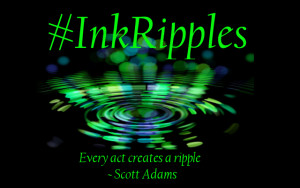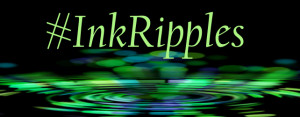In February, join the conversation as Mary Waibel, Kai Strand, and Katie L. Carroll talk genres for this month’s #InkRipples posts.
There are lots of ways to define genre in literature (see the dictionary definition of “genre” or the Wikipedia entry on “literary genre”). For our intents and purposes of today’s discussion, let me specify by saying that when I’m talking about genre, I mean as they are defined in modern publishing, not necessarily limited to genre fiction (which contains certain popular genres) but sticking to fiction.
Specifically, I want to address common misconceptions about genre. If you’ve ever done any research on genre yourself, you’ll see it can be quite contentious, so I don’t expect everyone to agree with me here. Let’s dig right in…
 Misconception 1 – Age Categories Are Genres
Misconception 1 – Age Categories Are Genres
One key to understanding genre is to know what it’s not. I often see people refer to YA (young adult) as a genre. It’s not, no more than adult fiction is a genre. YA is a category that designates a target age range for its readers and will center around characters of that age group. That’s not to say that readers out of the target age range won’t enjoy those books (you all know I mostly read YA, and I’m in my 30s). The same goes for middle grade–it’s not a genre but an age category.
Misconception 2 – Genre Is Easy To Define
So what is a genre? So-called “popular genres” or “genre fiction” include fantasy, science fiction, horror, mystery, romance, and thriller, among others. A story in one of these genres will follow the conventions of its genre and comes with certain expectations from readers. For example, you can expect a fantasy story to include fantastical elements that don’t exist in our world. Each popular genre has its own conventions, though there certainly can be overlap.
What about literary fiction? Is that a genre in and of itself? You certainly wouldn’t call literary fiction a popular genre as it cannot be defined by the genre conventions of those popular genres. Literary fiction tends to focus on the human condition and themes rather than plot. It’s more an absence of popular genre, but in publishing, I would say it’s considered its own genre. There are still expectations from a reader about what they will get with literary fiction, and you’ll find it as a category in book stores.
Are contemporary and historical genres? There’s some debate here. They denote whether a story takes place in a historical time period or in contemporary times, but you also have to take into consideration when the book was written. A story written in the 1980s about stuff that happened in the 1980s was contemporary then, but a YA story written today about stuff that happened in the 1980s is historical. You can have a contemporary romance or a historical one, but there’s also just historical fiction that deals with a historical time period or event but with fictional elements. Historical doesn’t necessarily have elements of mystery or romance or thriller, but a reader would have certain expectations from an historical novel. Contemporary is tricky because it usually fits into one of the popular genres, and if it doesn’t, it’s probably considered literary fiction.
Complicating the issue of genres even more is sub-genres and novels that can fit into more than one genre. Paranormal is a sub-genre of fantasy that specifically includes a heavy focus on paranormal elements, often in the form of mythical or magical creatures (i.e. TWILIGHT). A fantasy story can have paranormal elements but can also be categorized as fantasy and not necessarily paranormal. What about a story set in a futuristic world with science-fiction elements that also has heavy romance elements? Is it science fiction or romance? It may be categorized as both (a science-fiction romance) or may be categorized with the more dominant one, and people may not agree on which one is more prevalent.
Misconception 3 – Literary Fiction Is More Serious Than Genre Fiction
It’s been said that literary fiction is about confronting reality while genre fiction is about escaping reality. Literary fiction is often said to deal deeper with character and uses plot as a secondary device, but I’ve read plenty of genre fiction that gets deep into character while also having a riveting plot. Writing quality of literary fiction is also often lauded as superior to genre fiction, but I think the quality of writing largely depends on who’s doing the writing and not so much on genre (read Laini Taylor’s DAUGHTER OF SMOKE AND BONE for a lyrical and beautifully written fantasy story). So while it might be true that you’re more likely to study literary fiction in school and read genre fiction on your own time (though school’s are delving into popular fiction more than ever), that doesn’t necessarily make literary fiction more serious.
In fact, as a writer of fantasy, mystery, and thrillers, I would fight you to the death (strictly in a fantastical world, of course!) to argue that genre fiction can be, and often is, as serious as literary fiction. In fact, I think genre fiction can be very effective at commenting on reality and providing a deeper understanding of our own world, but it also gives that reality a more palatable context by using the conventions of genre fiction. The lens of genre fiction can almost make it easier to comment on and gain perspective of current issues of our world.
This discussion of genre has gotten longer than I intended, so I’m going to stop with these three misconceptions. Do you think I totally missed the mark on genre? Or maybe I missed something big that you’d like to see discussed in a future post. I’d love to hear your thoughts on literary genres.
# InkRipples is a monthly meme created by Katie L. Carroll, Mary Waibel, and Kai Strand. We pick a topic (February is all about genres), drop a ripple in the inkwell (i.e. write about it on our blogs), and see where the conversation goes. We’d love to have you join in the conversation on your own blogs or on your social media page. Full details and each month’s topic can be found on my #InkRipples page.
InkRipples is a monthly meme created by Katie L. Carroll, Mary Waibel, and Kai Strand. We pick a topic (February is all about genres), drop a ripple in the inkwell (i.e. write about it on our blogs), and see where the conversation goes. We’d love to have you join in the conversation on your own blogs or on your social media page. Full details and each month’s topic can be found on my #InkRipples page.






















Interesting thoughts. I personally think genre fiction is labeled as “escapist fiction” as a deliberate way to belittle the large number of people who like it and to discredit the ideas held within genre fiction, especially science fiction. Many of the people most into genre fiction are marginalized people, and discrediting the books we love helps them discredit us completely.
That’s just my optimistic side speaking *cough*
Great thoughts! I agree, and it’s so annoying that anyone feels the need to belittle someone for what they read or write. This happens in YA (though I maintain YA is not a genre) from time to time. An article will come out or someone will make a disparaging comment about YA, like they can’t believe that something written for teens and read by teens can be “good” literature. There’s a reason I read so much YA…because it’s really freakin’ good!
Thank you for this well-thought out post on genre. I noticed that I had one of the misconceptions! I thought YA was a genre. Nonetheless, genre is there to help readers wad through the masses of books to choose from. If you like mystery, you go to that genre first. That doesn’t mean you might not pick up an historical romance on the way.
Needless to say the controversy between literary and genre is quite heated. I read both. Some literary fiction I find tedious (not all) because the author thinks they have license to violate all the rules: 1) long paragraphs 2) big overly ostentatious words 3) Lots of internal dialogue. Some genre fiction is too loose–so plot driven that the characters are cardboard.
All this means is that there are good and bad books in all genres. Just because something is labeled literary doesn’t make it a “good” book. Just because something is labeled genre fiction doesn’t make it a quick, easy read.
My two cents. Thanks for letting me know about YA not being a genre!
Hi, Joan! Don’t worry about the YA thing…I see it all the time and totally get why people call it a genre. 🙂
I also read genre and literary fiction. And, yes, there is good and bad in both. I’m all for not letting a label stop someone from reading a book. Read what you like, try new things sometimes, and don’t be ashamed of any of it!
I’ve come to think of genres as dog breeds. There are the pure breeds, but many more mixtures. The marketing folks struggle for tighter definitions, but real books are alive in the sense that they often don’t fit neatly into one shelf.
Great analogy, Mirka! Books are like living, breathing entities that dare to be undefinable at times.
As someone who’s read Black Butterfly, I totally would agree that your work rivals Lit Fic! (And dang do I love all of Lani Taylor’s work!) Great post!!
Awww, thanks! I have to admit I’ve only read the first in Laini Taylor’s series and have to get to the others, but you only need to read one book to know how gorgeous her writing is.
Great choice of misconceptions. Inthink people sometimes confuse YA as a genre because when we’re trying to determine the genre of our written work we’re always told, “where would you find it shelved in a book store or library?” Seeing both places have a YA section, I can see where the confusion would come in.
Wow! I had no idea. I really never think about genre, just read and write what appeals to me. Yeah, I’m simple. Now I need to learn more for my “InkRipples post next Monday. Best get busy.
Interesting information. I had no idea. I really never think about genre, just read and write what appeals to me. Yeah, I’m simple. Now I need to learn more for my “InkRipples post next Monday. Best get busy.
Sorry for the repeat. They kept telling me I’d already posted, but it never showed up, so I posted again and now we have it twice. I will never learn how this stuff works. 🙁
Hah! Sometimes it takes a few minutes for the comments to show up. Looking forward to your take one genre next week.
I’ll be talking a bit about the YA genre 😉 next week. This is such a great post and when I referred to smarter people knowing more about such things in my own post – I meant you!
I kinda wish we would’ve had the forethought to tape us discussing this when the three of us met. What a great vlog that would’ve been.
<3
I’ll admit I did a little research on the topic before I posted, though I still feel like there’s more to learn.
That would have been awesome if we had recorded us when we met…maybe next time. 🙂
This was very well thought out and some great information! I’m in the group that agrees YA (which I write) is not a genre but rather a demographic. This was all very good food for thought and I hate to be boring but I find that I agree with you! Thanks for the post!
Thanks, Amy! I’m not going to be mad if someone refers to YA as their favorite genre (and I probably won’t correct them), but it’s always something I think about in my head when I hear it referred as a genre.
Great post! Thanks for setting me straight. I found myself thinking of YA and middle-grade as genres, but you’re right, they are not.
Thanks! I think the age category being called a genre is the most common misconception I see. It’s totally valid to say “I love YA.” It’s a perfectly legit way to categorize books; it’s just not a genre. 🙂
I have no idea who would have the misconception that figuring out genres are easy. Or maybe I’m just biased because I always have a tricky time with my books.
I think readers often think genres are easy to define because they can go to a bookstore and find the genre they like and pick up a book. It’s a whole different story with writers!